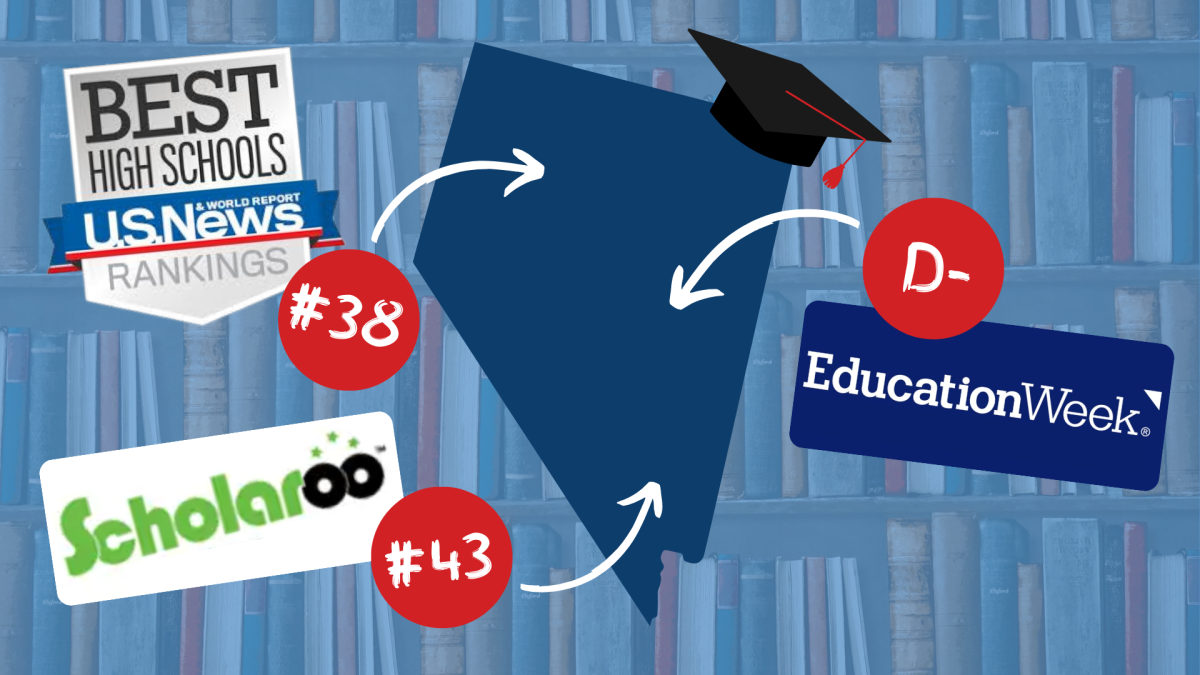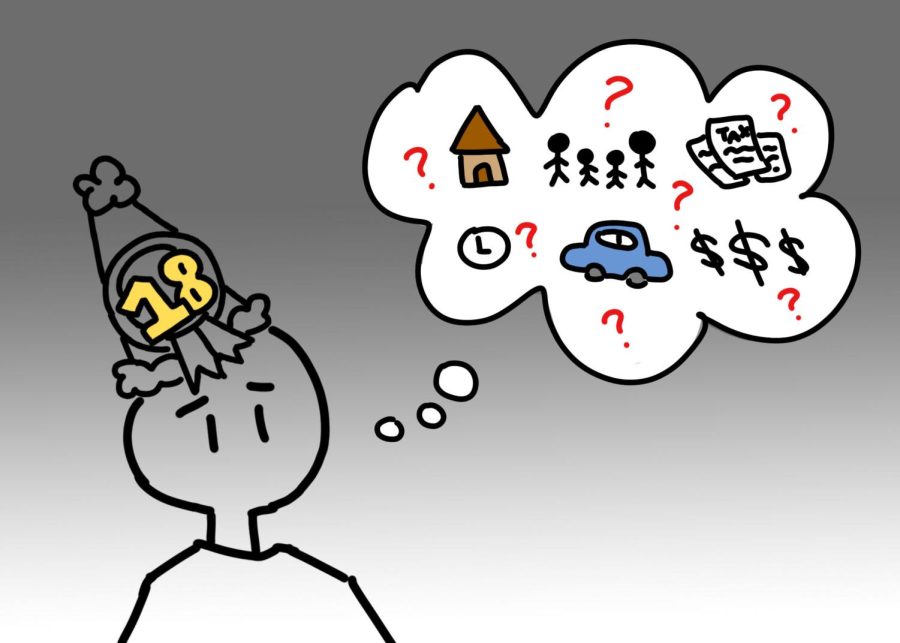Corrosive Effects of Standardized Tests
With average SAT and ACT scores rising and the acceptance rates of America’s best universities declining, it should be no wonder as to why there’s a broad obsession with doing well on standardized tests. Even a slight variance in a score could be the difference between college acceptance and rejection.
However, the mania over scores has had unforeseen consequences: increasing disadvantages for low-income students, torn-apart family relationships and assorted mental health issues such as anxiety.
Understanding the actual issues at hand requires listening to the students, teachers and parents who are the most affected, and seeing the human impact that these tests can have.
“Standardized tests are held with so much weight that a lot of [students] can burn themselves out working hard towards getting good grades when those aren’t the only things that should matter,” senior Elizabeth Wigington, who is in contention to be valedictorian, said. “It’s not just who you are as a student; it’s who you are as a person.”
The calm before the storm
Patiently waiting for instructions, senior Daphne Dimatulac flips through her ACT practice test. She goes back home in hopes of obtaining a 26 composite score. The next day, Dimatulac goes back to school to review her test and sure enough, she was able to achieve the score she wanted.
Dimatulac felt that she needed the extra boost to her ACT score, so she could get accepted to her dream college, University of Washington. The appeal of many test programs is their ability to provide a specialized education for the specific exams.
“The ACT boot camp was a good experience, but I was nervous at first because I didn’t really know what I was getting myself into,” Dimatulac said. “I thought the boot camp would’ve given me extra unneeded stress, but it actually eased my mind knowing that I could be one of the handful of people who could finish the test efficiently and effectively at the same time.”
Before students took the ACT practice test, an optional practice boot camp was held for students to learn several tips to help them finish with as little stress as possible. Dimatulac felt thankful for the specific skills she acquired from the boot camp.
“I was a little hesitant for the ACT Boot Camp because I’ve already taken the practice test twice and felt that it was enough help for the real test,” Dimatulac said. “I ended up going with my friend because she was telling me how [the instructors] will actually give useful information on how to finish each section in the given time which is something I struggled with.”
Dimatulac is one of the millions of students who seek out test preparation programs, or “test prep” for major college entrance exams like the SAT and ACT. Programs, such as the “ACT Boot Camp” that CCSD provides, allows students to partake in activities and lessons that improve their test-taking abilities.
And she isn’t isn’t alone in this. Different types of test prep services have remained extremely popular in the United States. Kaplan Test Prep, one of the most popular test prep companies in the US, made an astonishing $250 million in 2018. Furthermore, almost four million students have used the SAT official test preparation course on Khan Academy.
Test prep programs are often touted for their high success rates, and there’s solid evidence to support that. According to expert Wayne Camara, private test prep programs increase the average student’s SAT score by 25 to 32 points on the 1600 scale. Dimatulac can personally attest to the success of these programs.
“The things that the test instructors taught us how to do were not taught to me by any of my teachers last year,” Dimatulac said. “One thing they did was time us on each question of a section, so we’d know how to properly use our time. They also told us not read all words of a question, only the ones that were crucial would actually help me find an answer.”
However, there is a catch-22 to these programs-while they are remarkably successful, many of them are also extremely expensive. The aforementioned boot camp costs $149 for CCSD students. And the highest-quality tutors can charge thousands of dollars for just a single session. These high costs can be an enormous barrier to low-income families, and are a likely reason why wealthy students do significantly better on these tests.
“With the cost of the boot camp, I wish it was a smaller group of people, so it could be more personal and easier to learn,” Dimatulac said. “The classrooms should have been opened up to allow for smaller groups instead of having everyone in the ballroom. There were a lot of students, and at times, it was difficult to see and hear the instructors talk, but they gave us helpful tips.”
The lack of access to test prep among low-income people reveal that these test programs can leave behind poorer students. The increased importance of these tests disadvantages low-income test-takers, who simply can’t afford the programs to increase scores.
This inequality has encouraged many teachers to incorporate test prep into their curriculums. English teacher Laura Penrod does daily practice ACT quizzes for the Reading and Writing sections.
“It’s important that students have some exposure to it, because if not, they’re not going to be able to know what to look for when they get to the exams,” Penrod said. “90% of the time I get kids come back and tell me that they felt the most prepared for the English portion versus any other portion, and that’s because we’ve talked about it since August.”
These test prep programs can serve as a substitute to much pricier test prep alternatives. With the most expensive programs being inaccessible for many students, teachers incorporating test prep into their curriculum could mean more people receiving access to crucial help.
“I think [Penrod’s test prep is] working because actually practicing with real ACT questions can receiving feedback allows us to see what we’re doing wrong, and Penrod also gives good advice on how we can improve,” junior Jared Stahl said. “It gives lower-income people that opportunity to be prepared for almost exactly what the test is going to be like.”
While the benefits of test prep currently mostly accrue to wealthy students, Penrod’s test prep demonstrates that they can be shared to all students. However, we must keep in mind that these prep programs must be given consistently to students to ensure that they retain the information and skills.
“The ACT boot camp just introduced me to how the test would be formatted,” Wigington said. “It definitely helps to do more review just to get the basics, but if you’re not going to be good at test-taking, it’s definitely going to be a lot harder for you, so going to tutoring once or going to one boot camp isn’t going to prepare you for the test.”
The crushing weight of pressure
Much of the desire to do well on standardized tests stems from parents’ overzealous desire to see their kids be successful. As colleges become more selective and their standards grow, the pressure from parents to do well on standardized tests is only increasing.
“It kind of just gives me motivation,” sophomore Cheri Chan said. “Basically anything lower than a 1340 on the SAT is failing for [my dad], so in order for him to not take away my social privileges, I need to do good.”
Chan finds her parents’ involvement in her academic career to be exaggerated compared to other students. However, now that the national SAT/ACT averages are increasing, parents expect more out of their children. The drive to do well is fueled by the need to get into a good college to please parents.
“Academically, there’s expectations that I set that she knows she has to achieve,” Joe Chan, Cheri Chan’s father, said. “With that comes hard work, but she knows beforehand what is expected of her. She needs to do her best and that’s what is expected.”
Failure to live up to standards can hold consequences for students. Lackluster standardized test scores for Chan instigate consequences from her father in the form of both lecturing and limited freedom.
“I wasn’t allowed to go out, no texting, no FaceTiming,” Cheri Chan said. “He threatens my social life a lot, so [I’m] scared [of losing those privileges].”
It’s understandable why many parents are so keen on taking an active role in their children’s lives. Doing well on standardized tests like the SAT and ACT make a student significantly more likely to be successful later on in life.
“I want her to be self-sustaining,” Joe Chan said. “[Success] is a building block to your future, and once you have it, no one can take it away.”
Wigington, contrarily, rarely feels pressure from her parents. Instead, she’s encouraged to develop a love for learning and drive to do well on her own. She finds that good score on a nation-wide test to help her feel more achieved in her terms.
“I don’t get any material rewards for placing high on a standardized test,” Wigington said. “My parents are proud whenever I do, but it’s just another thing I have to get done.”
Under these circumstances, Wigington quickly developed the passion to do well by herself. In the absence of the never-leaving urge to please her parents that many students feel, she cultivated a love of learning that stuck with her.
“My parents want me to succeed, of course,” Elizabeth Wigington said. “They do appreciate getting good grades on tests, but they consider actually learning and comprehending the topic as more important.”
Andrew Wigington, Elizabeth’s father, tries to support his daughter as much as possible, but at a distance. She has continually succeeded due in part because of the absence of excessive parental pressure– scoring a 1450 on her SAT and a 33 on her ACT.
“I always try to impart knowledge from my own experiences when giving her advice on [school],” A. Wigington said. “I make sure she’s well supplied with all the tools she needs for school. It’s mostly emotional support on how to deal with stress while still enjoying education.”
There’s no doubt that most parents want their children to succeed. However, parenting methods that place excessive pressure on students can have opposite effects. Students, because of this excessive pressure to perform to a certain expectation, may not develop the drive to do well on their own, but rather the drive to do well solely to get into a good college or to please their parents.
“The A’s and achievement just happen to be an extra pro of having the drive to want to do well and understand,” E. Wigington said. “My dad especially loves and appreciates education, so that inevitably rubbed off on me, as well.”
Juggling the present, future
From the anxiety caused by preparing for important exams to finishing work from other classes, to the stress evoked by parents, many students suffer from severe mental impacts. Whether it’s as severe as diagnosed anxiety or as small as crying sessions in the shower, students are consistently impacted by the stress from tests, advanced classes and extracurricular activities.
“The build up to standardized tests is so stressful because there’s so much emphasis placed on it,” Wigington said. “If you want to go to a selective school for college, getting a score that may be great for some people, but not enough for the school can damage a person’s self-esteem. It’s all about the expectations you set for yourself.”
However, standardized testing isn’t the only cause of stress and isn’t the only thing hurting student’s mental health. Everyone has different ways of handling the stress that comes with school, and throughout the year some students, such as Miller, go into overdrive trying to ensure they keep their good grades. With AP English, AP Stats, DECA, NHS and six other classes, she has found herself constantly stressed and standardized testing was just the cherry on top of all the work.
“I wanted to do everything before graduating, so I joined multiple clubs and took classes I’ve always wanted to take, such as anatomy, even though I’m not in a medical program,” Miller said. “The clubs and classes can be very rigorous. Eventually, I started to feel overwhelmed. [As] assignments started to stack up and I would get behind and I started to worry more, but still couldn’t do anything to fix it. I had to eventually leave some clubs I was in and focus completely on my classes to make sure I had time to do homework or study.”
Students find that trying to manage everything in school, while also focusing on tests which may dictate their entire future, and it becomes increasingly difficult.
“It was really stressful, especially in an AP class, with the added weight of the ACT, because it was too much,” Miller said. “The stress due to the ACT was really damaging to my health. I [lost] a lot of sleep due to studying or just plain worrying over how well I [would] do. It got to the point where studying and making sure I did good on the ACT became my entire life. Overall, I wouldn’t want to experience that again.”
A variety of mental issues can emerge due to the amount of pressure students feel such as high stress levels and test anxiety.
“It’s pretty rough because I stay up until 12 or 1 am studying for tests,” Miller said. “Even though I stay up that extra amount of time, I still feel underprepared for the test. I second guess myself while actually taking it because I’m so fixated on getting a good score that all of my preparation just mixed together.”
With all the stress that students receive from school and testing, avoiding school and classes that cause too much anxiety seems better to students than going into class to fail a test. By staying home some students might give themselves a moment to breathe, even though when they go back they know they will be piled with work.
“I wanted to stay home to avoid homework or classes, but I would have to eventually make that homework up and go to school,” Miller said. “The fact that I had to go back the next day really crushed me, since I would have to complete the assignment due the day I skipped, but also the assignment that was handed out. It felt like I became two weeks behind, when I only missed one day.”
Due to all of these circumstances, students’ social life is also negatively impacted. Rather than focusing on enjoying their life with friends and family, many students cram to study everything they’ll need for the test.
“Around the time of the ACT, I didn’t really have a social life,” Miller said. “I was was mainly in my room doing homework or studying when I wasn’t at school or sleeping. There would sometimes be days where I didn’t see my family at all because I was so stressed. There would be weeks where I would go to school and then back home and repeat the cycle. I went out like once or twice, but I spent most of my time looking for strategies or reviewing concepts that I had to remember from previous years to prepare for the test.”
Students such as Miller have found ways to calm themselves down from the stress of testing, by engaging in healthy coping mechanisms such as surrounding themselves with people
Balancing stress about academics with the acknowledgement that one bad score is not the end of the world is critical in ensuring that students don’t feel one of the largest consequences of test obsession.
“Remember that preparing and studying a little is better than nothing and getting the best score you can is better than failing and take time to destress,” Miller said. “I’ve been managing everything by doing what I can and managing my time the best I can and prioritizing. My loved ones have been there to make me laugh and help me if I’m having trouble.”
Lasting Impacts
Although the importance of tests like the SAT and ACT are widely acknowledged, there are multiple studies that have been found and proven about how students are impacted by these tests. The social, familial, and mental harms of the obsession over test scores are often talked over or quieted, in spite of their real consequences.
The important thing to note is that students must strike a balance between valuing hard work on standardized tests with a balanced and healthy lifestyle. The “climb to the top no matter what” mentality that many people have is completely toxic for students.
When students don’t see standardized tests as a measure of their knowledge but instead a proxy for their worth, the damages can be enormous. Low-income students are left behind, family relationships become fractured, and students’ mental health takes a severe hit. Making sure that students are prepared for these exams, while also being cautious of the effects that an obsession over these scores can have, is key to making sure that students aren’t being harmed.
“It’s cliche, but don’t let your grades define you,” Wigington said. “I definitely think our school prepared us for [standardized tests,] but I also think that your schooling shouldn’t just be preparing you for standardized testing.”



![Working in the Student Success Office, Attendance Secretary Lordis Depiazza inputs a student’s absence excuse note. Students are required to bring an excuse note to the attendance office within three days of any absence. “Reminding students that being in school is important because it reflects towards your grades and being able to do any activities with the school,” Depiazza said. “[It] seems to get the students' attention about wanting to be in school.”](https://southwestshadow.com/wp-content/uploads/2025/10/IMG_8313-1200x800.jpg)

![Squaring up to a practice dummy, sophomore Cypher Andres prepares to throw a punch. Dummies are regularly used to help him prepare certain hits to take his opponents down. “[Boxing dummies help me practice] because it’s basically a model of the body,” Andres said. “It helps with accuracy, such as pressure points behind the ear, and a clean liver shot can end the fight.”](https://southwestshadow.com/wp-content/uploads/2025/10/IMG_5728-e1759850486200-1200x864.jpg)

![Arranging the fabric on the floor for a new project, senior Sapphyre-Ann Leung plans out her attire for the next deadline. With the recent closures, students now had limited resources and less margin for error with the fabric and materials they had in stock while trying to reach strict deadlines. “Joann’s had a lot of high-end fabric for our fashion competitions,” Leung said. “We couldn’t just buy ten yards of fabric from Hobby Lobby or Walmart. Since [Joann Fabrics] is no longer open, we have to buy items online, which is way more expensive.”](https://southwestshadow.com/wp-content/uploads/2025/10/IMG_0038-1200x800.jpg)
![Swaying and preparing to toss the tennis ball, Dylan Grove practices serving. Grove had been training in preparation for her upcoming matches against Chaparral and Doral Red Rock. “[Both teams are] both very tough opponents, but I am ready for whatever gets thrown my way,” Grove said.](https://southwestshadow.com/wp-content/uploads/2025/10/image-1200x900.png)










